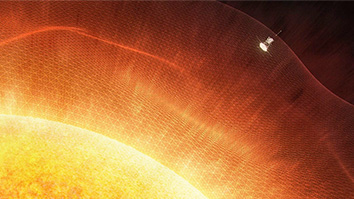Citation
Chau, J. L., Galindo, F. R., Heinselman, C. J., & Nicolls, M. J. (2009). Meteor-head echo observations using an antenna compression approach with the 450 MHz Poker Flat Incoherent Scatter Radar. Journal of Atmospheric and Solar-Terrestrial Physics, 71(6-7), 636-643.
Abstract
In this work we present a novel use of the Poker Flat Incoherent Scatter Radar (PFISR) to study meteor-head echoes with wide (W) beams. Until now, most of the meteor-head echo studies have been performed with High-Power Large-Aperture Radars (HPLARs) using very narrow (N) beams. At PFISR we have implemented an antenna compression approach using a defocusing scheme, similar to Chirp (linear frequency modulation) in pulse compression. The resulting effective beam is ∼3 times wider than the narrowest PFISR beam. Using the signal-to-noise ratio (SNR) as a proxy measurement of cross-section, from the combined W and N beam experiments, our main results are: (1) observed meteors in the W beam are approximately half the number of meteors observed in the N beam, (2) we detected 10 times more large cross-section (strong) meteors (>15dB if they were measured by the N mainlobe) than using only the N beam, and (3) more than 15% of the total N meteors were observed in the N sidelobes, therefore being at least 20 dB stronger if they were observed in the N mainlobe. Our results are summarized in a corrected distribution of relative meteor cross-sections as if all of them were observed with the N mainlobe, namely correcting their SNR values depending on where in the beam they were detected (sidelobes or mainlobe). In addition, we show a qualitative meteor cross-section distribution that one can obtain combining W and N beams. The resulting distribution is incomplete, since the W beam is not sensitive enough to detect the very small (weak) meteors, but could provide new information about the large cross-section events.


